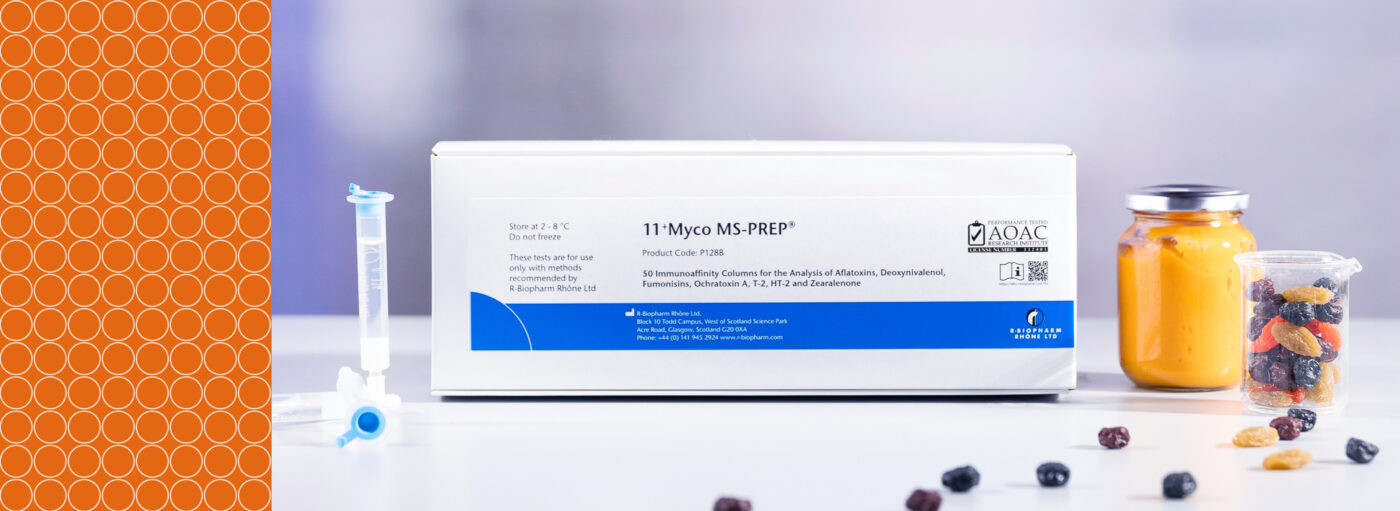
Fumonisin
Reliable tests for the detection of fumonisin in food
- Home
- /
- Analytes
- /
- Mycotoxins
- /
- Fumonisin
Fumonisin: Monitoring and analysis
Importance of monitoring fumonisins
Fumonisins are carcinogenic, neurotoxic, hepatotoxic, and pneumotoxic metabolites produced by Fusarium moniliforme, a mold fungus that specifically grows on corn. Monitoring fumonisins is crucial due to their severe health risks to both humans and animals.
Toxic effects of fumonisins on different species
The toxic effects of fumonisins vary significantly across animal species:
- Horses: Neurotoxic effects can be induced at fumonisin concentrations of approximately 5-10 mg/kg in feed.
- Pigs: Ingestion of 4-16 mg/kg body weight can result in liver cirrhosis, while more than 16 mg/kg body weight may lead to pulmonary edema.
- Chickens: Can tolerate higher fumonisin concentrations in feed, up to 75 mg/kg.
- Cattle: Appear to be insensitive to high fumonisin concentrations.
Regulatory compliance and consumer protection
Due to the severe health risks associated with fumonisins, it is essential to regularly monitor and analyze their presence in corn and corn-based products to ensure safety for both human and animal consumption.
Key benefits of fumonisin monitoring
- Consumer protection: Ensures that corn and corn-based food products are safe for consumption by detecting and quantifying fumonisin contamination.
- Animal health: Protects livestock from the adverse effects of fumonisin-contaminated feed, improving animal welfare and productivity.
- Regulatory compliance: Helps manufacturers comply with food and feed safety regulations, preventing legal and economic repercussions.
- Quality assurance: Maintains the integrity and safety of food and feed products by preventing the distribution of contaminated items.
- Advanced detection methods: Utilizes reliable and efficient analytical platforms for the accurate monitoring of fumonisin levels in corn and corn-based products.
Conclusion
Monitoring fumonisins is essential for protecting human and animal health, ensuring regulatory compliance, and maintaining the quality of corn and corn-based products. By employing advanced detection methods, manufacturers can accurately identify and quantify fumonisin contamination, ensuring the safety of their products. This proactive approach supports robust quality control processes, upholds food safety standards, and fosters consumer trust in food and feed products.
Product portfolio
| Product | Description | No. of tests/amount | Art. No. |
|---|---|---|---|
| RIDASCREEN® Fumonisin ECO |
RIDASCREEN® Fumonisin ECO is a competitive enzyme immunoassay for the quantitative determination of fumonisin in corn and feed. Please note: it will replace the previous test kit RIDASCREEN® Fumonisin (Art. No. R3401) soon. Read more |
Microtiter plate with 96 wells (12 strips with 8 wells each) | R3411 |
| RIDASCREEN®FAST Fumonisin ECO |
RIDASCREEN®FAST Fumonisin ECO is a competitive enzyme immunoassay for the quantitative determination of fumonisin in corn and feed. Read more |
Microtiter plate with 48 wells (6 strips with 8 removable wells each) | R5603 |
| Product | Description | No. of tests/amount | Art. No. |
|---|---|---|---|
| RIDA®QUICK Fumonisin RQS ECO |
RIDA®QUICK Fumonisin RQS ECO is a quantitative immunochromatographic strip test with an aqueous extraction method for the detection of fumonisin in corn. Results are evaluated with the RIDA®SMART APP software (Art. No. ZRSAM and an approved … Read more |
20 x test strips | R5606 |
| Product | Description | No. of tests/amount | Art. No. |
|---|---|---|---|
| QualiT Pure™ Multi-Ergot Alkaloid MS |
Solid phase clean-up column for the purification of multi-mycotoxins. Read more |
50 columns (syringe format) | TC-QP2100-50 |
| QualiT Pure™ Multi-tox MS |
Solid phase clean-up column for the purification of multi-mycotoxins. Read more |
50 columns (syringe format) | TC-QP1100-50 |
| FUMONIPREP® |
Immunoaffinity columns are used in conjunction with HPLC or LC-MS/MS for detection of fumonisins B1 and B2 in a wide range of commodities. Read more |
10 columns (3 ml format) (RBRDP31), 50 columns (3 ml format) (RBRP31B) |
RBRDP31 / RBRP31B |


